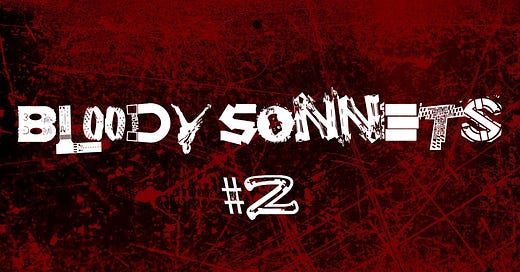Welcome to my series of adapting Pavol Országh Hviezdoslav’s The Bloody Sonnets into free-verse. This is the second of thirty-two sonnets.
In 2018, John Minahane translated these sonnets into English while maintaining the sonnet form. It is an excellent translation available here. I am doing a more loose adaptation. Following the adaptation, there is a discussion.
But now is not the time to sing of fruitful blood,
which flows from the heart and leaps into the palm,
blood that can produce magic
to change a dead rock into a golden apple.
Nor about the blood that exposes the sun to shadow,
lit like a signal flame spreading tower-to-tower —
with the awe of dawn's daylight
that fills us like fresh bread
or then shields us where there is danger...
No, this is about the blood that thundered in anger,
raging from above the timberline
and flowed into the peaceful plains like a red bullet
through a canyon.
About this,
this is the blood we shall sing until we choke!
The original is in the Slovak language, which was originally written in 1914:
Nie o tej plodnej spievať dnes je čas: o krvi, zo srdca čo šprihnúc v dlane, kamkoľvek čiahne, tvorí požehnane, i z mŕtvej skaly zlatý kúzli klas; o krvi, v tmu čo vnáša slnka jas, sťa olej vzplanúc — kahan pri kahane — duševným zrakom denné na svitanie: a takto chlebom-svetlom živí nás, a vtedy, štíti aj, kde nebezpeč je… Lež o krvi, čo vybúšila v hnev, i zúri-búri, ohňom páli, vlečie povodňou, rozmetá svet hŕbou pliev, či odrážkou jak úpusty v zmar tečie… ach, o tej znie, kým nezalkne sa, spev!
Being an anti-war voice throughout human history has to be one of the most frustrating endeavors.
John Minahane, in the introduction to this translation made this comment:
One could say that Hviezdoslav in his Bloody Sonnets flung himself, like some Slavic Don Quijote, against the poets of all Europe. It is hard now for anyone to imagine the force of the torrent of war poetry that poured out in August 1914, in lands from Ireland to Russia.
When I started this substack I had decided to focus on poetry. I hold strong antiwar views, but I am also interested in this return-to-analog cassette project. It’s through Marshall McLuhan I’ve discovered these are perhaps the same.
In his book War and Peace in the Global Village he writes:
When one has been hurt by the new technology, when the private person or the corporate body finds its entire identity endangered by physical or psychic change, it lashes back in a fury of self-defense.
When our identity is in danger, we feel certain that we have a mandate for war.
So war and media theory are not unrelated. Coincidentally, Nicolas Carr, in his latest book Superbloom published just this week, highlights this connection specifically as it relates to World War I:
In the immediate aftermath of the June 28 assassination of Archduke Franz Ferdinand […] hundreds of urgent diplomatic messages raced between European capitals through recently strung telegraph and telephone wires. As the historian Stephen Kern has described, the rapid-fire dispatches quickly devolved into ultimatums and threats. Rather than calming the crisis they inflamed it. […] Even as they impeded negotiations, the new telecommunication systems enabled armies and navies to mobilize much faster than had been possible when military orders traveled by courier. By August, the First World War was underway.
McLuhan also remarks that war is the quickest form of education. Each war has a piece of technology that defines it: the long bow, the stirrup, cruise missiles, drones, etc… I don’t yet know Hviezdoslav’s interests or involvement in technology — I did find his manuscripts of these sonnets online.
As I continue to learn about Hviezdoslav through his poetry, I am now wondering if my “media” interests and the “antiwar” ones aren’t really just two sides to the same cassette, that I’m tossing at windmills.
Here is the previous Sonnet.







This hit at my lately, mostly ungovernable attention span in its weakest joint and I'm really glad you wrote this. I also think part of the aversion you've mentioned having engaging with lengthy works online / preference or focus on short poetry does us a service, because you're so considerate in formatting as well as alerting us to what we're about to go through, hahaha! *Here is a poem, there will be some additional commentary...* haha, I genuinely love that, and I've never read the works you've referenced here, but this quote; "When our identity is in danger, we feel certain that we have a mandate for war" resonates down to whatever core piece of myself that cannot come unstuck when so many accoutrements have fallen away, witnessed by all the other gunk of identity-grout undeniably residing, too. This kinda made me wanna write poetry, albeit my own brand of bad, bad poetry wherein I forge stupid metaphors from visions of my soul as not-entirely-separate from a filthy bathroom with its limescale fixtures burdened or haloed by layer by layer by layer of cheap laminate or something and I don't do that much anymore. Thanks, Josh. P.S. I have no idea what I'm talking about either, but a lightning storm just now rolled in over where I am, and as any person who's been a child in the tropics knows, despite the scum decor of abandoned duty, a bathroom quickly becomes something more important than pretty. Ahhhhhhh I'm in a tin shed on a laptop powered by a 40 metre cable leading into my house and the wet beats pound down aaaaahhhhhhhhhhh nah she'll be right. I'm going to benefit from a re-read of your beautiful translation now.
I always think because of WW2, WW1 gets little rememberance or less so in our time. It's nice again to read your posts on the history from this perspective.